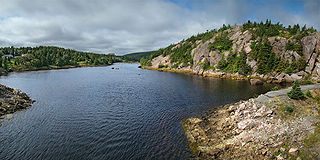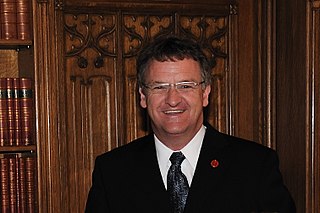
Newfoundland and Labrador is the easternmost province of Canada, in the country's Atlantic region. The province comprises the island of Newfoundland and the continental region of Labrador, having a total size of 405,212 km2 (156,453 sq mi) As of January 1, 2024, the population of Newfoundland and Labrador was estimated to be 541,391. The island of Newfoundland is home to around 94 per cent of the province's population, with more than half residing in the Avalon Peninsula. Labrador shares a land border with both the province of Quebec and the territory of Nunavut on Killiniq Island. The French overseas collectivity of Saint Pierre and Miquelon lies about 20 km (12 mi) west of the Burin Peninsula.

Avondale is a town located on Newfoundland's Avalon Peninsula in the province of Newfoundland and Labrador, Canada, which was incorporated in 1974. The community is situated at the southwestern head of Conception Bay in Division 1. It is located 59 km (37 mi) southwest of St. John's and 72 km (45 mi) northeast of Placentia.

Arnold's Cove is a town on Newfoundland's Avalon Peninsula in the province of Newfoundland and Labrador, Canada. It is in Division 1 on Placentia Bay.

The Newfoundland Railway was a narrow-gauge railway that operated on the island of Newfoundland from 1898 to 1988. With a total track length of 906 miles (1,458 km), it was the longest 3 ft 6 in narrow-gauge system in North America.

Placentia is a town located in the Canadian province of Newfoundland and Labrador. It consists of the amalgamated communities of Placentia ("Townside"), Southeast Placentia, Freshwater, Dunville and Jerseyside and also includes the Argentia Industrial Park.

The Cathedral of St. John the Baptist is an Anglican cathedral located in the city of St. John's, Newfoundland and Labrador, Canada. The church is considered to be the mother church for Anglicans in Newfoundland and Labrador.

Fabian Manning is a politician in Newfoundland and Labrador, Canada. Manning served as a Progressive Conservative and later as the independent Member of the House of Assembly for the district of Placentia and St. Mary’s from 1999 to 2005. From 2006 to 2008 he was the Conservative Party of Canada Member of Parliament for the riding of Avalon. After his defeat in the 2008 federal election Manning was appointed to the Senate of Canada on January 2, 2009, he resigned his Senate seat on March 28, 2011, to run for election in his former riding of Avalon in the 2011 federal election, but was unsuccessful. Prime Minister Stephen Harper re-appointed Manning to the Senate on May 25, 2011.

Argentia is a Canadian commercial seaport and industrial park located in the Town of Placentia, Newfoundland and Labrador. It is situated on the southwest coast of the Avalon Peninsula and defined by a triangular shaped headland which reaches northward out into Placentia Bay creating a natural harbour 3 km (1.9 mi) in length.

The Drake House is a two-story house with a low-pitched gable roof. It is located at 319 Main Road, Arnold's Cove, Newfoundland and Labrador, Canada.

Clarke's Beach is a town on Conception Bay in the Canadian province of Newfoundland and Labrador. In the 2021 census the town had a population of 1,400. It is the home of a number of well-known Newfoundland artists, and is a favourite place for retirement.

Touton is a traditional dish from Newfoundland, most usually thought of as a pancake-like bread dough commonly made with risen dough. Although pancakes are rarely made from homemade bread dough in Newfoundland, the memory of regional terms still exists in younger generations, such as the British English term tiffin, meaning "small lunch". The dish has a long list of regionally-distinct names, and can refer to two different types of baked or fried dough: the dough cake variant, usually fried; and a baked bun variant, made with pork fat. Toutons are usually served at breakfast or brunch and are on the breakfast menus of many local restaurants.

Newfoundland was an English and, later, British colony established in 1610 on the island of Newfoundland, now the province of Newfoundland and Labrador. That followed decades of sporadic English settlement on the island, which was at first seasonal, rather than permanent. It was made a Crown colony in 1824 and a Dominion in 1907. Its economy collapsed during the Great Depression and on 16 February 1934, the Newfoundland legislature agreed to the creation of a six-member Commission of Government to govern the country. In 1949, the country voted to join Canada as the province of Newfoundland.

O'Reilly House is a museum located in Placentia, Newfoundland and Labrador, Canada. It was built for Magistrate William O'Reilly who served as Magistrate of Placentia from 1897-1923. He was the son of Thomas O'Reilly who had been the magistrate of Placentia from 1877-97. In 1902, Magistrate O’Reilly employed the architect W.J. Ellis to build a Balustrade Queen Anne Victorian house that would serve as his family home.
Richard Harton O'Dwyer (1858–1922) was a Newfoundland merchant and politician. He represented Placentia and St. Mary's in the Newfoundland House of Assembly from 1889 to 1893 as a Liberal.

The Battle of Placentia (1692) was fought between the English and the French at Fort St. Louis in Placentia, Newfoundland and Labrador during King William's War. The battle lasted from 16 September until 21 September 1692.
Division No. 1, Subdivision B is an unorganized subdivision on the Avalon Peninsula in Newfoundland and Labrador, Canada. It is in Division 1 and contains the unorganized communities of Iona, Little Barasway, Placentia Junction, Point Verde and Ship Harbour.

Chesley Furneaux "Ches" Crosbie, is a Canadian lawyer and former politician. Crosbie was elected leader of the Progressive Conservative Party of Newfoundland and Labrador on April 28, 2018 serving until March 31, 2021. He served as the Leader of the Opposition in the Newfoundland and Labrador House of Assembly from 2018 until 2021.

Greenspond Courthouse is a wooden two-storey, heritage-designated courthouse built in the Second Empire style in Greenspond, Newfoundland and Labrador. Designed by the architect William Henry Churchill, the courthouse sits atop a hill overlooking Greenspond Harbour and Bonavista Bay. It replaced an earlier courthouse in the community.
Green's Harbour is a local service district and designated place in the Canadian province of Newfoundland and Labrador.

St. Luke's Cultural Heritage Centre is a heritage centre in the town of Placentia, Newfoundland and Labrador, Canada. Formerly an Anglican church, it has since been acquired by the Placentia Area Historical Society and is used for hosting events throughout the year. The historical society also owns the O'Reilly House Museum which is located next-door to the heritage centre. Until the 1950s, St. Luke's was considered the smallest church in Newfoundland.
















